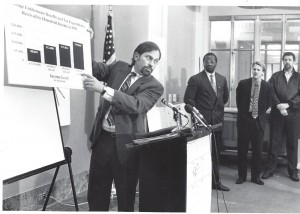One of my favorite visionary bills that never got a committee hearing was to morph Minnesota into proportional representation, whereby more than one person can get elected to represent a district. Any candidate who gets at least 10% of the votes in his/her district gets elected. So, for example, Candidate A gets 55% of the vote, Candidate B 29%, Candidate C 11%, and Candidate D 5%; then only A, B, and C get elected, and A gets 5 votes, B has 3 votes, and C has 1 vote at the Capitol. I saw it as a way to increase the number of voices that get heard in politics and get more ideas into play.
There are maybe plenty of Minnesotans who believe Third Parties need to be added to the mix, given more of a chance, and don’t like the gridlock rendering the two party system incapable of doing much. The bill, however, had no chance of passage in the Two Party Controlled Legislature. Then in 1994 I was given a real chance to do something for Third Parties. Nineteen-ninety-four was the year after I lost the Mayor’s Race and I was not particularly beholden to the Democratic Phoney Laborers who had supported my mayoral opponent by calling him a genuine Democrat while I was telling the voters that he was most certainly a chameleon dressed-up as a Democrat. (The guy I’m referring to, by the way, actually did become a turn-coat and join the Republican Party.) But this wasn’t the reason I said “Yes” when the Twin Cities Area New Party asked if I would be their candidate too, as well as the Democrat’s candidate, on a “fusion” ticket in my ’94 re-election bid. I said “Yes” because I was the leader of the Democrats in my district who understood the need for change.
My district was a “majority-minority district,” meaning Caucasians are outnumbered, and also one of the poorest in the State. We always suffered from low voter turn-out. If Third Parties could organize and have a decent chance, then maybe more people would pay attention to politics. This is one of the least understood parts of our political system. People excuse not voting by saying one vote doesn’t matter and/or nothing ever changes. The truth is that politicians pay more attention to those who vote than those who don’t vote. The mostly poor folks in my district who were not voting were actually voting to have their pocketbooks fleeced and wallets picked by the Powers-That-Be. I’ll never forget the time in a caucus meeting of Tax Committee Democrats I was told, “Andy, renters don’t vote; we’re giving the property tax relief money to homeowners.” The Democrats were not always my District’s best friend.
There is another sad truth about politics that my District understood: Our District was a “high index district,” meaning we almost always voted heavily for just the Democrats; and the problem (the truth of the matter) is that legislators tend to legislate in favor of districts where the race between the (two only) parties is more competitive. I was told more than once, “No Dawkins, we’re not putting that money into your district because you’ll get re-elected no matter what (and if not you, then another Democrat); we’re putting the money into a district where our Democrat incumbent needs some re-election help.” Sad, but true. Come on Third Parties! We need some help! Come on Jack! Come on Nick! Come on you Up & Comers!
Tomorrow: Another Supreme Court Case

